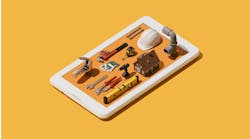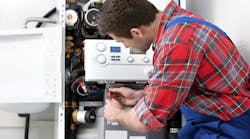I met a guy, a home service contractor, at a gas station driving a brand-spanking new GMC Yukon Denali, who told me it gets 45 miles to the gallon. He also told me he gets his home service technicians to sell. That should've told me something.
So, I had to ask myself, does this guy really think his Yukon gets 45 miles to the gallon? Has he actually seen it, tested it? I doubt he has. How about your technicians? Do you really believe that they'll sell? Do you really believe that they want to sell? What has the evidence been in our industry?
For a long time, I thought if I hired clean, sharp, articulate, intelligent technicians with mechanical aptitudes — even just a little, small bit of mechanical aptitude — that I could teach them to sell. Oh, and I certainly tried. I put 'em through every sales class there was. We watched videos and tapes. I tried to get 'em to read the books on salesmanship that I love, like Zig Ziglar. I tried to tell 'em it would be better for their families. They could make more money. It would be better for our customers because they would get better products.
Then it all came crashing down. It wouldn't be so bad if it only happened once, but that happened over and over and over and over. Don't get me wrong. It's not that some of them couldn't sell, but the ones that could sell, guess what? They really weren't service technicians. They were entrepreneurs. Well, guess what? I added five new competitors to my hometown market. No wonder the market gets tighter.
It's not that some of them couldn't sell, but the ones that could sell, guess what? They really weren't service technicians. They were entrepreneurs.
Do you feel like the phone doesn't ring enough in your office? That’s because the last 20 years, we’ve seen 10 or 20 times more contractors entering the market. That means 10 times, 20 times more competitors.
Why did we buy into this mentality? We didn't really. It was sold to us. We were told that we could get technicians to sell if we just got a big enough stick or a big carrot. One or the other, either beat 'em up and tell 'em to sell or lose their job. Or make the carrot so big that they're going to want to sell. How many of you have done a little bit of both?
Well, you know what happens when you tell a service technician that he's either going to have to start selling or go work someplace else? They throw the keys on our desk and walk away. I know you know what I'm talking about.
What about the carrot? How could we put a carrot in front of a service technician? Incentives, bonuses, perks, commission, performance pay, more money, better salary, less hours. I mean, how far do you go? Your billable hour drastically increases, yet how many of you have huge profits at the end of the year to show that it worked?
So, we’ve had 50 years of trying to get techs to sell. Is there a solution? Can it be easier? Can it be more fun? It'd be a lot easier if we'd just turn the clock back 50 years, wouldn't it? When service people came to work, did a great job, enjoyed their work, and, at the end of the week the boss would pat them on the back and say, "Wow, you're amazing! You can fix anything! Good job."
So why can't we turn back the clock? Well, we have a problem. The problem is up-front pricing. You see, the thing that works in today's market is to give the customer the price up front so there's no surprises. When we started doing that, the technician had to face sales resistance and face rejection from customers, who would tell him straight to his face that he's not worth that much money.
You see, the thing that works in today's market is to give the customer the price up front so there's no surprises.
Well, we can't turn the clock 50 years, but maybe we could learn something. Are there industries that have solved that problem?
I had a steak the other morning. A T-bone steak at the Waffle House. I think it was $11 or $12. How long do you think it took the waiter to convince me to pay $12 for that steak? You're right. He didn't have to convince me at all. I walked in, looked at the menu, and felt like steak and eggs that morning, and bought it. Did you know that Waffle House sells more steak than any other restaurant in the United States? Isn't that amazing? $12. Does that seem like a lot for a steak? How many of you have been to a fine restaurant? A fancy steakhouse? One where the steak starts at $50 and that doesn't even include the potato. Could you imagine the sales resistance, the rejection, that the waiter must take when he's trying to sell that steak to somebody who knows they could go right down to the Waffle House and get it for less?
But, they don’t. Waiters and waitresses don't have to sell, do they? Why is that? Well, they use a very simple system. A pre-printed list... just a menu. When a menu is done right, guess what? There's no selling. Menu pricing is so simple that servers do it every single day with no sales resistance, no price objection, and no buyer’s remorse.
So, stop selling. Let the customer buy. Leave the power in the customer's hands. They will always buy more than you could ever sell them.
Rodney Koop is the founder of The New Flat Rate, a home service menu-selling system designed to put profit directly into the hands of plumbing, electrical and HVAC contractors.


